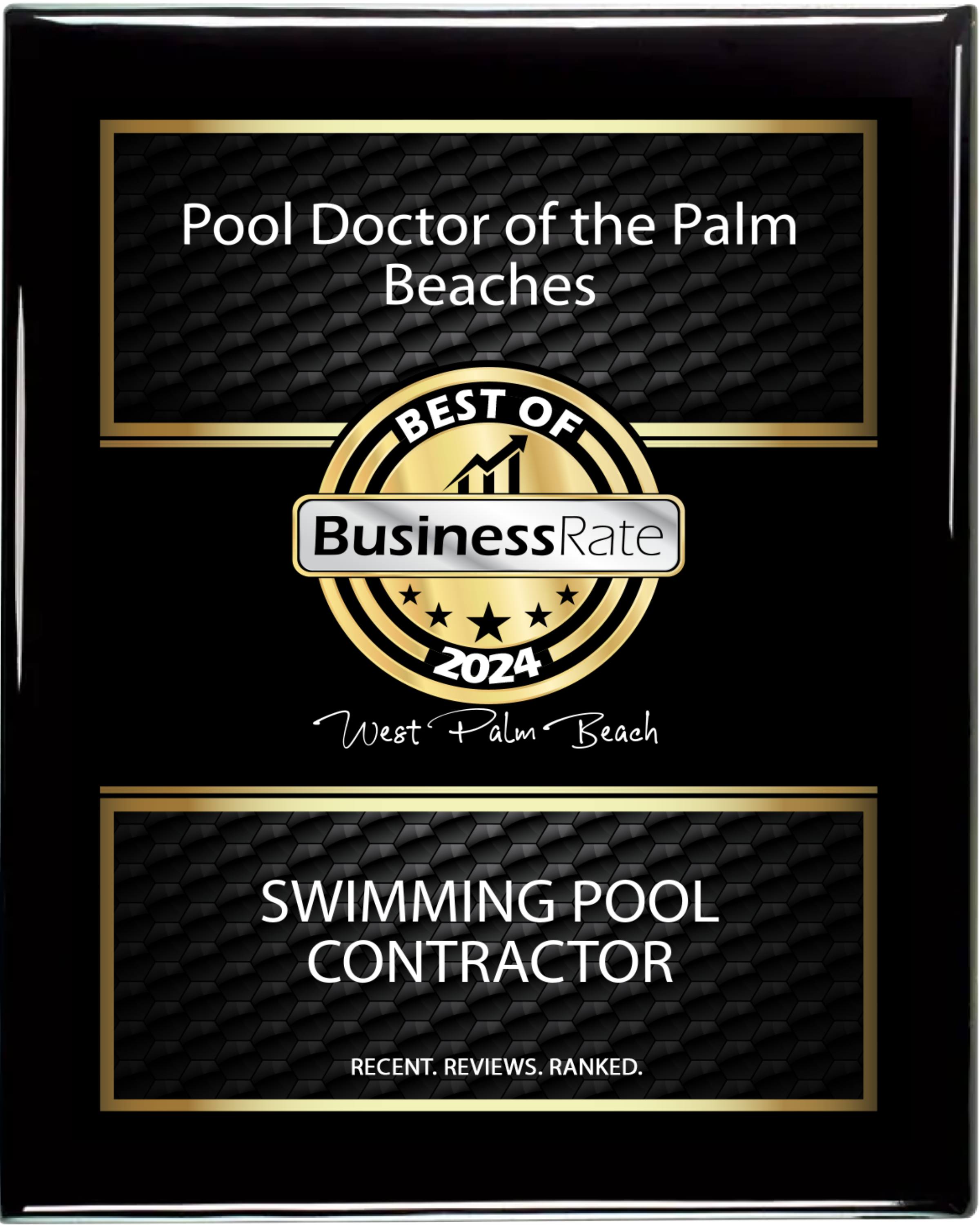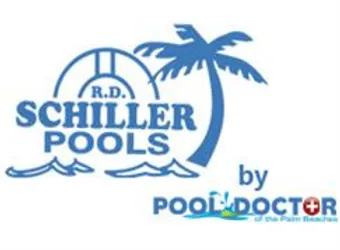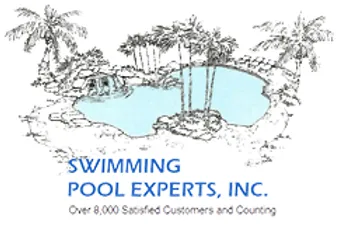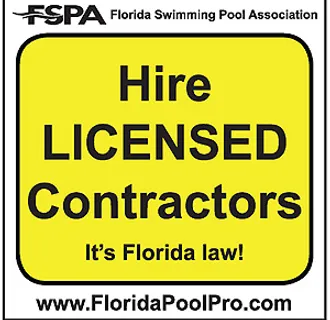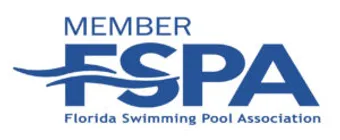When selecting pool maintenance professionals, you'll need to verify their industry certifications (APSP, NSPF) and assess their experience with specific pool systems. Consider their service packages, pricing transparency, and emergency response protocols – including 24/7 availability and guaranteed response times. Don't forget to check their insurance coverage, client references, and maintenance track record. These key factors will help guarantee you're making a well-informed decision that protects your investment. Understanding the complete evaluation process will reveal supplementary critical considerations.
Certifications and Industry Experience
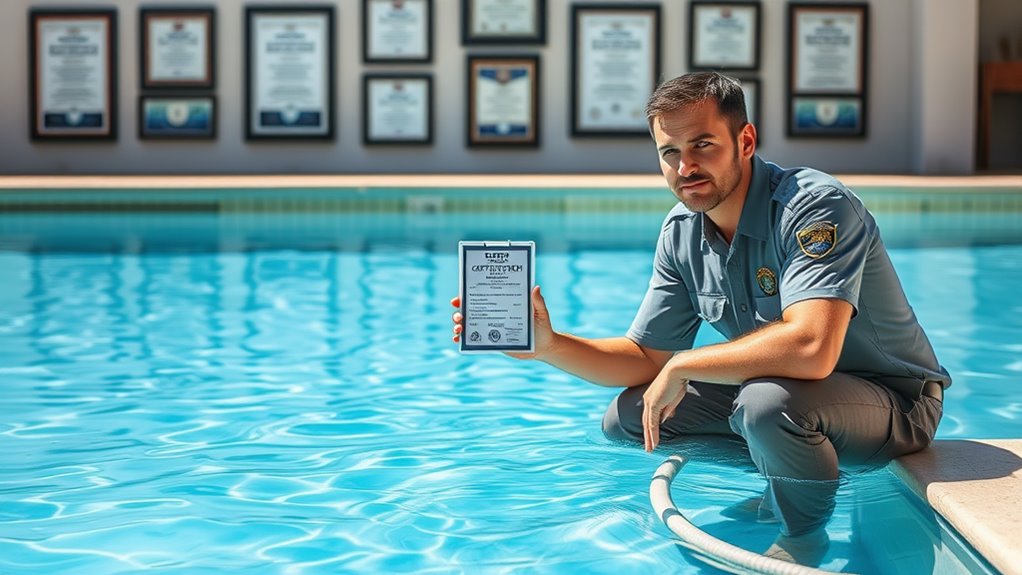
When evaluating pool maintenance professionals, you'll need to verify their certifications and industry experience initially. Look for technicians certified by recognized organizations like the Association of Pool & Spa Professionals (APSP) or the National Swimming Pool Foundation (NSPF). These certifications demonstrate their commitment to industry expertise and ongoing education in pool maintenance standards.
Check how long they've been servicing pools and ask about their experience with your specific type of pool system. Industry expertise matters greatly when dealing with complex chemical balancing, equipment repairs, and safety protocols. Request references from their long-term clients and verify their track record of successful pool maintenance. Don't hesitate to inquire about their continuing education practices, as certification importance extends beyond initial qualifications to staying current with evolving pool technology and maintenance techniques.
Service Packages and Maintenance Plans
When selecting a pool maintenance service, you'll need to evaluate whether a standardized package or customizable plan better suits your specific needs. Most companies offer both monthly and annual payment options, with annual contracts typically providing cost savings and improved benefits. You'll also want to confirm if emergency response services are included in the base package or require supplementary coverage, as unexpected pool issues can arise at any time.
Customizable Vs Standard Plans
Pool service companies typically offer both standardized and customizable maintenance plans to accommodate different needs and budgets. When evaluating these options, you'll find that customization benefits include tailoring services to your pool's specific requirements, while standard plans offer predictable pricing and established service schedules.
Consider these key differences when choosing between plan types:
- Standard plans follow fixed schedules with pre-determined services like weekly cleaning, chemical balancing, and equipment checks
- Customizable plans let you adjust service frequency, select specific treatments, and add specialized maintenance tasks
- Hybrid options combine basic standard services with plan flexibility for seasonal adjustments
Your choice should align with your pool's size, usage patterns, and maintenance complexity. While standard plans work well for typical residential pools, customizable options better serve unique features or specific environmental challenges.
Monthly or Annual Options
Professional service providers offer two primary contract durations for pool maintenance: monthly and annual packages. Monthly maintenance plans provide flexibility and allow you to evaluate the service quality before committing long-term. You'll have the freedom to switch providers if you're not satisfied with their performance.
Annual contracts typically come with cost savings, as providers offer discounted rates for longer commitments. You'll benefit from guaranteed service slots, priority scheduling, and often receive complimentary services like water testing or chemical balancing. These contracts also guarantee consistent maintenance throughout the year, including peak swimming seasons when service providers are in high demand.
Consider your budget, schedule, and long-term plans when choosing between monthly maintenance and annual contracts. If you're confident in the provider's reputation, an annual plan often delivers the best value.
Emergency Response Coverage
Since unexpected pool issues can arise at any time, emergency response coverage should be a crucial factor when evaluating maintenance service packages. You'll want to confirm your chosen provider offers thorough emergency preparedness and rapid response protocols that align with your pool's specific needs.
When reviewing emergency coverage, look for these critical elements:
- 24/7 availability with guaranteed response times under 4 hours for critical issues like pump failures or chemical imbalances
- Direct access to emergency technicians through a dedicated hotline or mobile app, bypassing standard scheduling channels
- Clear documentation of what constitutes an emergency and the associated costs for after-hours service calls
Verify that the provider maintains a local presence with fully-stocked service vehicles, confirming they can address urgent situations promptly without waiting for parts or supplies.
Insurance Coverage and Liability Protection
When selecting a maintenance provider for your swimming pool, verifying proper insurance coverage and liability protection should be your top priority. You'll need to confirm they carry both general liability and workers' compensation insurance with adequate liability limits. Request certificates of insurance and review them carefully for coverage exclusions that might affect your property.
Make certain their policy includes protection against chemical spills, equipment damage, and potential injuries that could occur during maintenance work. You'll want minimum coverage of $1 million per occurrence and $2 million aggregate. Don't hesitate to contact their insurance provider directly to verify active coverage status. Also, make sure their policy includes completed operations coverage, which protects you from issues that may arise after they've finished their work on your property.
Equipment and Chemical Quality Standards
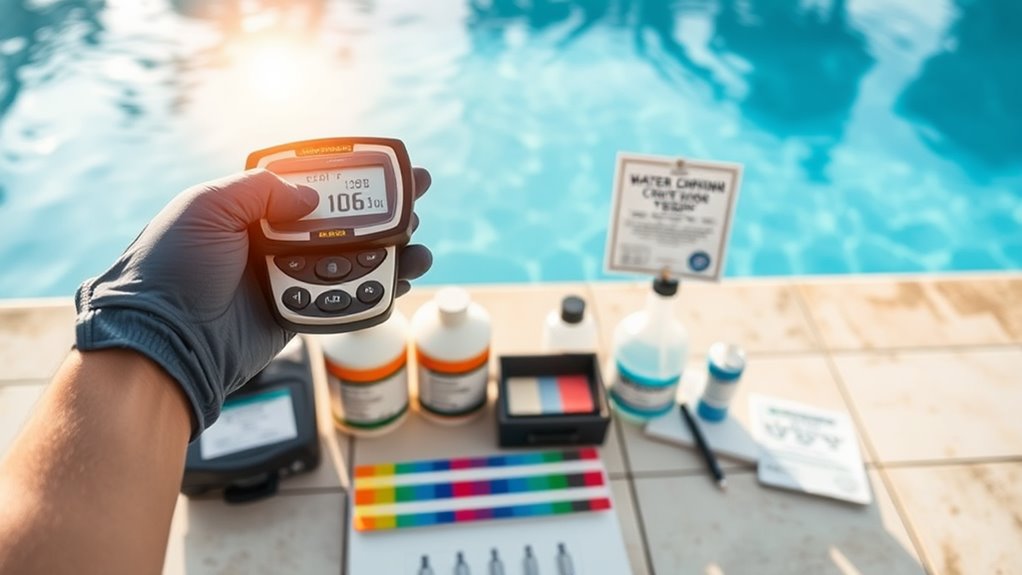
Top-quality pool maintenance requires equipment and chemicals that meet or exceed industry standards. When evaluating professionals, you'll want to verify they use commercial-grade equipment and EPA-approved chemicals for best results. Ask about their chemical testing protocols and equipment durability standards to confirm they're not cutting corners with subpar materials.
Choose pool professionals who use industry-standard equipment and EPA-approved chemicals to ensure your pool receives the highest quality maintenance.
To identify professionals who maintain high standards, look for these quality indicators:
- Digital water testing equipment that provides precise chemical readings within 0.1 PPM accuracy
- Commercial-grade vacuum systems and filters rated for your pool's specific volume and type
- NSF-certified chemicals stored in temperature-controlled environments with clear batch numbers and expiration dates
Don't hesitate to request documentation of their equipment maintenance schedules and chemical sourcing. Professional companies will readily share this information to demonstrate their commitment to quality.
Response Time and Emergency Services
When evaluating a pool maintenance company's emergency response capabilities, you'll want to confirm their 24/7 service availability and specific protocols for handling urgent situations. Your chosen provider should offer multiple emergency contact methods, including phone, text, and email, with guaranteed response times clearly outlined in their service agreement. It's crucial to verify that they maintain dedicated on-call technicians who can quickly address critical issues like equipment failures, chemical imbalances, or structural problems that could compromise your pool's safety and functionality.
24/7 Service Availability
Since pool emergencies can occur at any time, verifying a maintenance company's service availability and response times is essential for protecting your investment. Look for providers that offer flexible service hours and maintain consistent seasonal availability throughout the year. You'll want a company that accommodates your schedule and can handle both routine maintenance and unexpected issues efficiently.
Critical service availability factors to evaluate:
- 24/7 emergency response capabilities for critical issues like pump failures, major leaks, or chemical imbalances
- Extended weekday hours that align with your schedule, including early morning or evening appointments
- Weekend availability for routine maintenance and unexpected problems
Confirm whether the company offers year-round service or operates seasonally, as this can impact their ability to address your pool's needs during off-peak months.
On-Call Response Protocols
Professional pool service companies maintain specific protocols for emergency response that define how quickly technicians will arrive on-site after receiving your call. You'll want to understand their on-call service structure and emergency protocols before signing a maintenance contract.
| Response Type | Expected Timeline |
|---|---|
| Routine Issues | 24-48 hours |
| Equipment Failure | 4-8 hours |
| Chemical Imbalance | 2-4 hours |
| Water Loss | 1-2 hours |
| Safety Hazards | Immediate |
Ask potential providers about their after-hours support system and whether they charge extra fees for emergency visits. Quality companies will offer 24/7 phone support and maintain detailed documentation of emergency responses. You should also verify if they provide temporary solutions while waiting for replacement parts or extensive repairs.
Emergency Contact Methods
How quickly you can reach your pool maintenance provider during an emergency directly impacts the safety and functionality of your pool system. When evaluating potential service providers, verify they offer multiple emergency contact methods and have clear emergency protocols in place.
Your pool maintenance company should provide:
- A dedicated 24/7 emergency hotline that connects you directly to an on-call technician
- A mobile app or online portal for submitting urgent service requests with real-time tracking
- A backup contact system, such as text messaging or email, with guaranteed response times
Verify that their emergency protocols include specific response timeframes for different types of pool emergencies. Ask about their after-hours service rates and whether they prioritize existing customers during peak emergency periods. Request documentation of their emergency contact procedures for quick reference.
Client Reviews and Professional References
When evaluating pool maintenance professionals, client reviews and references serve as essential indicators of their reliability and service quality. You'll want to analyze feedback from multiple sources, including online platforms, social media, and direct testimonials. Look for patterns in client satisfaction ratings and recurring comments about their work quality, punctuality, and communication.
Don't hesitate to request professional references from their current or past clients. Contact these references to inquire about specific aspects of their service, such as response times, problem-solving abilities, and long-term maintenance results. Through thorough feedback analysis, you can identify providers who consistently meet or exceed client expectations. Pay special attention to reviews that mention how they handle challenges or unexpected issues, as these situations often reveal their true professional capabilities.
Pricing Structure and Contract Terms
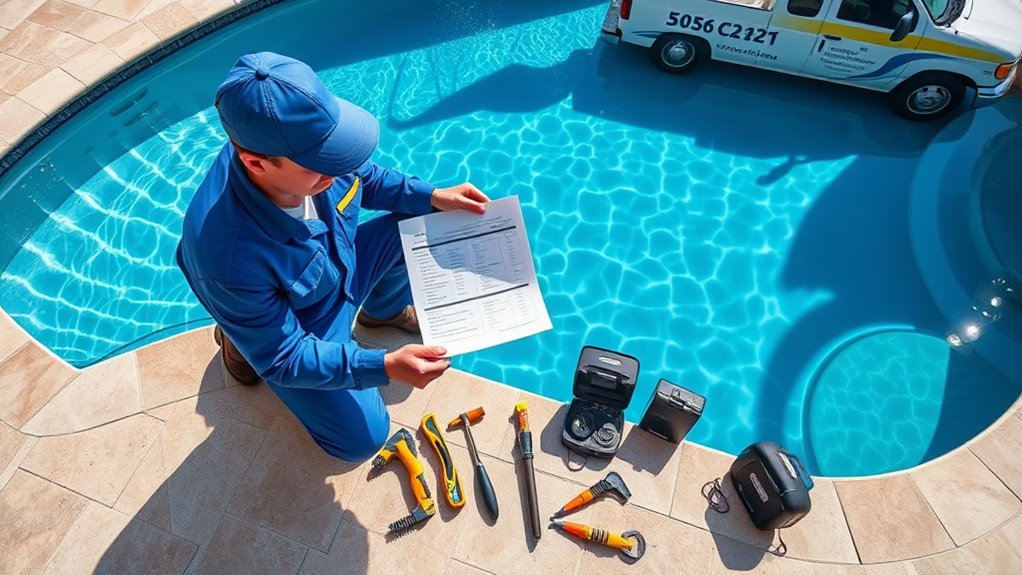
Understanding pool maintenance costs begins with a thorough review of pricing structures and contract terms. You'll want to guarantee pricing transparency from your provider, including detailed breakdowns of regular maintenance fees, chemical costs, and emergency service rates. Look for contract flexibility that allows you to adjust service frequency based on seasonal needs.
When evaluating maintenance contracts, focus on these critical components:
- Monthly service fees with itemized listings for chemicals, equipment checks, and water testing
- Emergency response protocols with clear pricing for after-hours or weekend visits
- Contract duration options, from month-to-month agreements to annual commitments with potential cost savings
Always request written documentation of payment terms, cancellation policies, and service guarantees. Compare multiple providers' pricing structures to determine the most cost-effective solution for your pool's specific requirements.
Frequently Asked Questions
How Often Should I Drain and Refill My Swimming Pool?
You should fully drain and refill your pool every 3-5 years, depending on your water quality and pool usage. The drain frequency can vary based on factors like climate, chemical balance, and total dissolved solids (TDS) levels. Regular refills benefit your pool by preventing mineral buildup, improving water clarity, and reducing chemical requirements. If you're noticing persistent water balance issues or cloudy conditions despite proper maintenance, it's likely time for a fresh refill.
Can Pool Maintenance Professionals Help Diagnose Unusual Water Color Issues?
Yes, pool maintenance professionals can provide expert water color diagnosis to identify and resolve discoloration issues. They'll use advanced testing methods to check chemical balances, algae presence, metal content, and other factors that affect water appearance. Their professional expertise allows them to quickly determine if your pool's color changes are due to chemical imbalances, contamination, equipment problems, or environmental factors. They can then implement targeted solutions to restore your pool's proper clarity and color.
What Signs Indicate My Pool Pump Needs Replacement?
You'll notice several key signs when your pool pump needs replacement. Unusual pump noise, such as grinding, screeching, or humming, indicates failing bearings or motor issues. Watch for water leaks around the pump housing or connections, which suggest deteriorating seals. Other red flags include reduced water flow, frequent loss of prime, motor overheating, or the pump requiring constant restart. If your pump is over 7-10 years old and showing these symptoms, it's likely time for replacement.
Is It Necessary to Maintain My Pool During Winter Months?
Yes, winter pool care is essential, even when you're not swimming. You'll need to maintain proper chemical levels and protect your pool's infrastructure from freeze damage. Proper winterizing techniques include adjusting water chemistry, cleaning thoroughly, lowering the water level, draining equipment, and installing a winter cover. If you live in milder climates, you should continue regular maintenance but can reduce the frequency of chemical treatments and cleaning schedules.
How Can I Reduce My Pool's Energy Consumption Costs?
You can considerably reduce your pool's energy costs by implementing several key strategies. Install energy efficient equipment like variable-speed pumps, which can cut electricity usage by up to 80%. Consider solar heating systems to warm your pool water naturally. Use a pool cover to minimize heat loss and evaporation. Running your pump during off-peak hours and maintaining proper chemical balance will also help optimize energy consumption and reduce operating costs.

